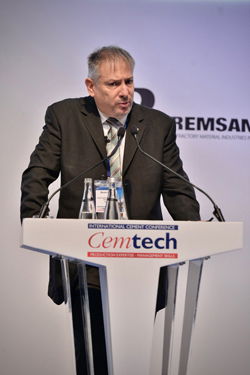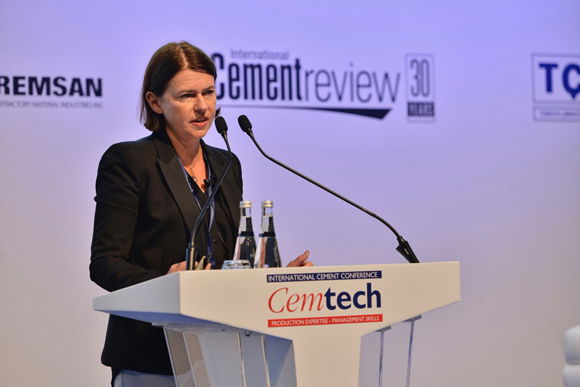More than 200 delegates of the global cement industry gathered for Cemtech Europe 2018, which is being held at the Conrad Istanbul Bosphorus, Turkey, from 14-17 October.
International Cement Review's Managing Director, Thomas Armstrong, inaugurated the conference by noting the declining worldwide utilisation rate for cement capacity. Mr Armstrong observed how new technologies are expected to pave the way forward, with this particularly represented on the programme by successful process optimisation case studies and an emphasis on alternative fuel utilisation.

Kerem Ersen, Turkish Cement Manufacturers'
Association, provides a positive outlook for the Turkish
cement industry
The first morning of the conference continued with an opening speech by the Turkish Cement Manufacturers' Association's Head of Economic Evaluations and Foreign Relations, Kerem Ersen, who welcomed the delegates to Turkey. Mr Ersen celebrated the success of the country's economy, which saw 6.7 per cent growth in GDP in the 1H18. Furthermore, Turkey's cement industry recorded a 7.7 per cent increase in production in 2017. This is expected to rise by an additional 3-4 per cent in 2019-23 on the back of positive developments in the housing, infrastructure and energy sectors. Meanwhile, capacity is expected to surge to 88Mta in 2018, following the completion of two greenfield and two brownfield projects.
Ashwani Pahuja, Dalmia Cement's chief sustainability officer, presented a keynote address on sustainable cement manufacturing. Mr Pahuja began his outlook by stating how the company had recorded a 17.7Mt reduction in carbon emissions over the past five years. Impressively, its carbon footprint sits 40 per cent lower than the global average for cement companies. In addition, Dalmia Cement intends to become carbon negative by 2040.
Jean-Christophe Lefèvre-Moulenq, CM-CIC Market Solutions, spoke about how the supremacy of the European 'Big Five' major cement producers is now being challenged by the multiple emerging markets players around world. He suggested how this could result in countries such as China and Turkey playing a larger role in the global industry, perhaps even by taking advantage of divested assets and expanding into Africa and across Europe.
Peter Hoddinott, independent consultant, looked at procurement strategies within established companies. An essential element within the structure of a business, the procurement team should be full of talented, innovative members. A successful procurement strategy will result in improved EBITDA and could even turn losses into profit-generating solutions.
Tom Dannemiller, Sabia, explained how we are in the midst of the Fourth Industrial Revolution, with digitalisation now a practical reality for cement plants. Through the implementation of Industry 4.0 software, cement facilities can easily detect anomalies in their data and therefore act upon it before a shutdown has to occur.
The day continued with a discussion on cement and clinker flows within the Mediterranean by Sylvie Doutres, DSG Consultants, with a significant 60 per cent of clinker exported from the European/Mediterranean region transported to Africa.

Sylvie Doutres, DSG Consultants, discusses the cement and clinker flows within the Mediterranean
As the programme moved beyond prevailing market trends and economic overviews, Nuh Cimento's Ilker Avci presented a study of its recent grinding and pyroprocessing upgrades. Furthermore, Basri Ogut, Walter Materials Handling/ATS Group, introduced the alternative fuel session by looking at three recent examples where the company's solutions were implemented to feed alternative fuels into the production process.
Alongside the conference programme, Cemtech Europe is hosting a 27-stand exhibition, where producers can discuss solutions and the latest manufacturing technology with equipment suppliers.
Cemtech Europe, held at the Conrad Istanbul Bosphorus, will conclude with a plant tour to Nuh Cimento's Hereke plant on Wednesday, 17 October.
